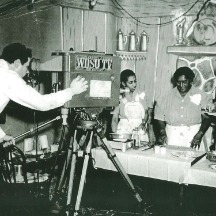In 1949 — more than a decade before Julia Child’s television debut — a boisterous Creole chef put on a cook’s uniform and made history. That was the year New Orleans NBC affiliate WDSU aired the first of many episodes of “Lena Richard's New Orleans Cook Book.” Running twice a week through 1950, its host, Lena Richard, would become the first Black woman to have her own cooking television show, breaking through barriers imposed by the Jim Crow-era South, and helping a wider audience learn more about the Black roots of Creole cuisine.
Even though its run was short-lived — she died in 1950 — Richard’s life and career would have a profound impact on food media, as she led the way as a leading figure in food television while breaking down gender and racial barriers. It’s only now that her legacy has gained momentum thanks to numerous researchers and writers determined to celebrate her accomplishments.
Born in 1892 in New Roads, Louisiana, the groundbreaking chef and cookbook author spent most of her life in New Orleans. As a youth, she would cook after school with her mother and aunt, who helped her develop an appreciation for cooking. She lived and breathed cooking, working with ingredients native to New Orleans’ Cajun and Creole cuisine such as fish and crustaceans; peppers, onions, and celery (the so-called holy trinity that’s the backbone of many dishes); and various breads.
Praising the Past


Eventually, a wealthy white couple of prominence, Alice and Nugent Vairin, hired her mother and aunt at their Esplanade Avenue home, where Lena would help out in the kitchen. Over the years, the couple recognized Richard’s talent and sent her to two cooking schools: one in New Orleans, and the Fannie Farmer Cooking School in Boston, where Richard graduated in 1918 before returning to New Orleans to cook professionally.
As Richard entered the culinary workforce, she found that she was imparting Black culinary culture to white cooks and travelers.
“It was often white men and women who were writing those histories of how Creole cuisine came to be, and they really emphasized the French connection, the Spanish connection,” said the Smithsonian’s National Museum of American History Ashley Young. A historian in the American Food History Project at the museum, Young has spent years working to learn more about Richard’s life and impact on New Orleans cuisine. Past writers, Young said, have underplayed the role of Black women in defining New Orleans food as well as the importance of West African, Caribbean, and Latin American food cultures in shaping Creole cuisine.
WDSU News - Celebrating Black History Month: The Life Of Chef Lena Richard, A Culinary Giant Who Broke Barriers
As Richard entered the culinary workforce, she found that she was imparting Black culinary culture to white cooks and travelers.
“It was often white men and women who were writing those histories of how Creole cuisine came to be, and they really emphasized the French connection, the Spanish connection,” said the Smithsonian’s National Museum of American History Ashley Young. A historian in the American Food History Project at the museum, Young has spent years working to learn more about Richard’s life and impact on New Orleans cuisine. Past writers, Young said, have underplayed the role of Black women in defining New Orleans food as well as the importance of West African, Caribbean, and Latin American food cultures in shaping Creole cuisine.
WDSU News - Celebrating Black History Month: The Life Of Chef Lena Richard, A Culinary Giant Who Broke Barriers
Advertisers | Contact Us | Events | Links | Media Kit | Our Company | Payments Pier
Press Room | Print Cover Stories Archives | Electronic Issues and Talk Radio Archives | Writer's Guidelines

 ">
">



